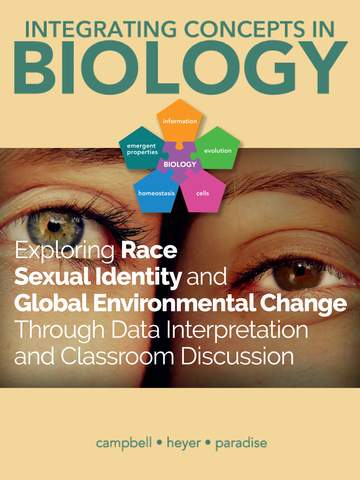
- ICB: Exploring Race, Sexual Identity, and Global Environmental Change - Purchase for Individual Use (NOT FOR A COURSE)
Important: If you are a student interested in purchasing a copy of this book for your class, you should search for your school, course name, or professor. Each instructor has a unique book created for their course, which you will not be added to if you purchase this version of the text. Digital textbooks on the Trunity eLearning platform also include interactive quizzes and other material for your class, so it is very important that you purchase the correct course.
If you are a student, please click here to find your course.
If you are an educator who is considering using this book in your class, you may:
- Request an evaluation copy
- Fill out our one-minute adoption form to get stated.
Overview
Biology has become too massive to memorize factoids the way you were encouraged to in traditional biology courses. This book is organized around the 5 Big Ideas of biology: Information, Evolution, Cells, Emergent Properties and Homeostasis - core concepts around which biological knowledge is built. Each Big Idea is examined at five levels of biological hierarchy. We have re-envisioned the introductory biology teaching and learning experience with a book that emphasizes concepts and the core competencies of critical thinking, quantitative reasoning, and data interpretation.
About the Authors
A. Malcolm Campbell
A. Malcolm Campbell earned his Ph.D. in cell and molecular biology from The Johns Hopkins University in 1992. Campbell was awarded a Pew Teacher-Scholar postdoctoral fellowship where he studied under Jan Serie at Macalester College. Campbell is a Professor of Biology and the director of the James G. Martin Genomics Program at Davidson College. He is the founding director of the Genome Consortium for Active Teaching (GCAT), which connects undergraduates with research-quality genomic learning materials. With his colleague Laurie Heyer, he wrote the first true genomics textbook for undergraduates, Genomics, Proteomics and Bioinformatics, now in its second edition. He won the American Society for Cell Biology’s Bruce Alberts Excellence in Education Award and the Hunter-Hamilton Love of Teaching award from Davidson College. He served as co-Editor-in-Chief of CBE-Life Sciences Education and is a charter member of the Society for the Advancement of Biology Education Research (SABER). His scholarship covers both education research and undergraduate-driven synthetic biology. Heyer and Campbell collaborate with their students to perform synthetic biology research.
Laurie J. Heyer
Laurie Heyer received her B.S. in Mathematics from the University of Texas at Arlington. She began research in bioinformatics for her Ph.D. in Applied Mathematics, which she received from the University of Colorado at Boulder in 1998. She was a postdoctoral fellow with Michael Waterman in the Center for Computational and Experimental Genomics at the University of Southern California. As Professor and Chair of Mathematics and Computer Science at Davidson College, Dr. Heyer teaches a cross-listed course in bioinformatics that draws both math and biology majors. She has also developed a two-semester sequence in calculus and modeling that focuses on applications in the life science. Heyer wrote “Math Minutes” for Discovering Genomics, Proteomics & Bioinformatics, co-authored with her colleague Malcolm Campbell. With her students, she developed software for microarray data analysis, and taught analysis methods to faculty in national workshops through the Genome Consortium for Active Teaching (GCAT). Her current research, in collaboration with Campbell and interdisciplinary teams of undergraduates, is in synthetic biology.
Christopher J. Paradise
Chris Paradise is Professor of Biology and Environmental Studies at Davidson College. Paradise earned his BS from the State University of New York at Albany, his MA from the State University of New York at Binghamton and his PhD from The Pennsylvania State University. In addition to introductory biology, Paradise teaches ecology, entomology, and several topical seminar courses such as ecotoxicology and renewable natural resources. He also occasionally leads a study abroad program in India. His research evaluates factors that influence biodiversity at a variety of scales. He has done research on diversity of organisms living in streams, in treeholes, on decomposing corpses, and on sustainably managed farms. His current research interests include effects of land use patterns on pollinator communities in parks and spatial and temporal dynamics of cankerworms, an urban forest pest. His papers document how communities in each of these ecological systems are affected by both abiotic and biotic factors. His research also informs his teaching; several research projects have been incorporated as investigative exercises in ecology and entomology courses. Paradise is passionate about raising awareness of the roles insects play in ecosystems and does community outreach on insect collecting, identification, and natural history.
